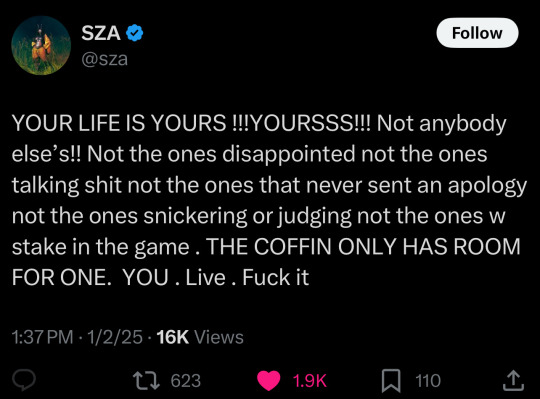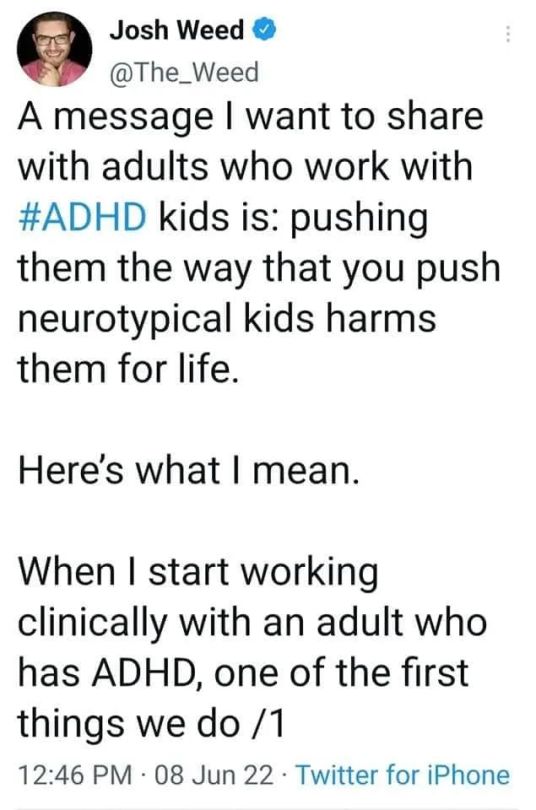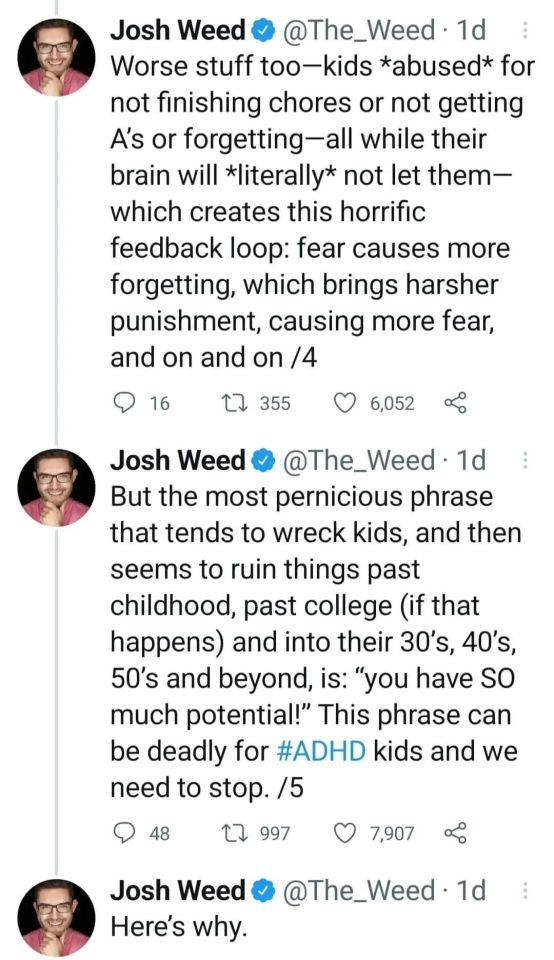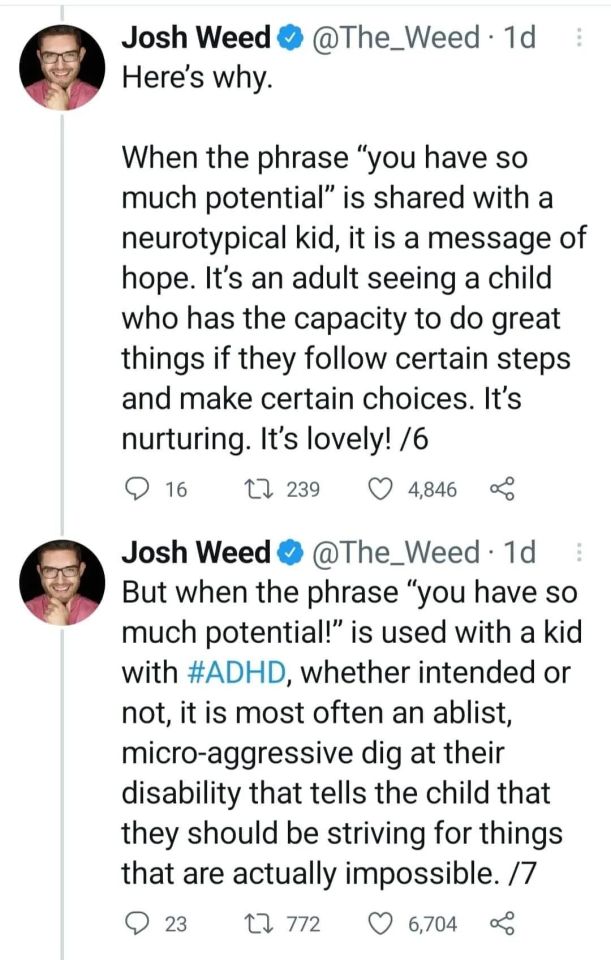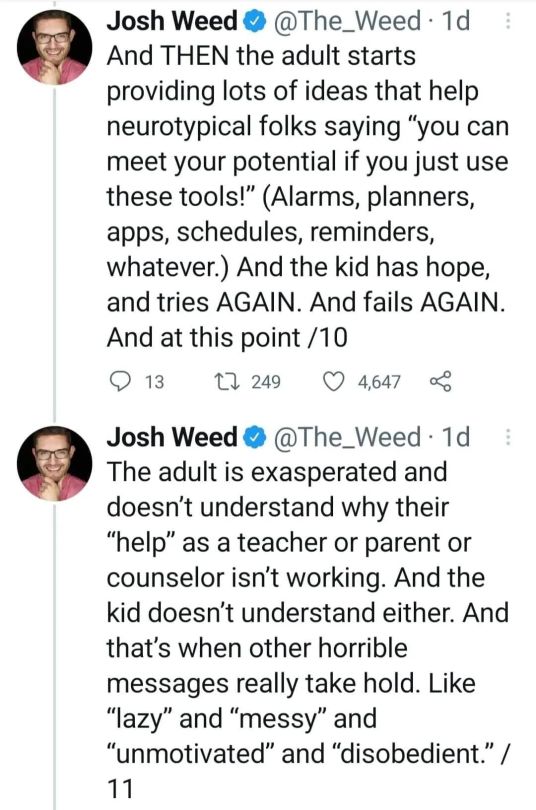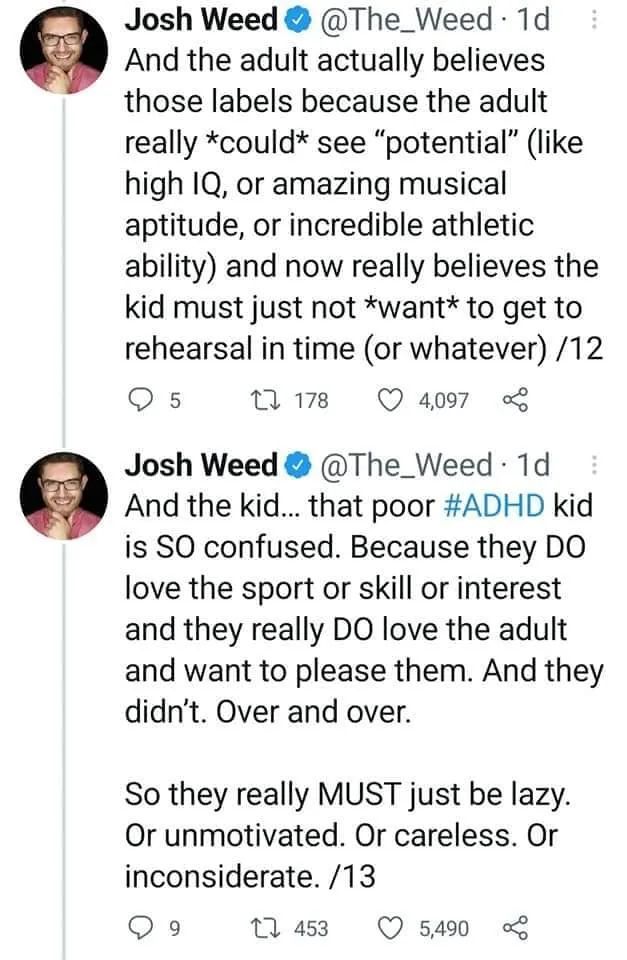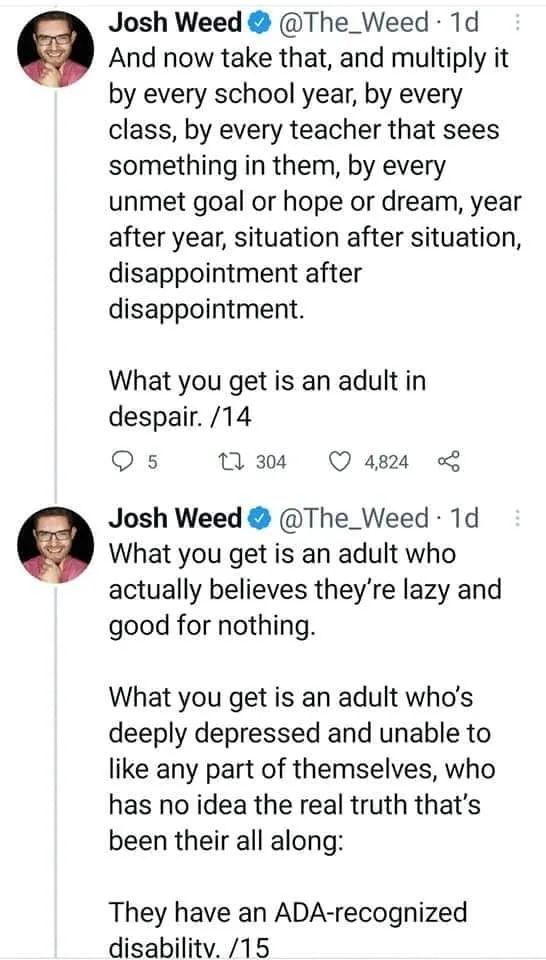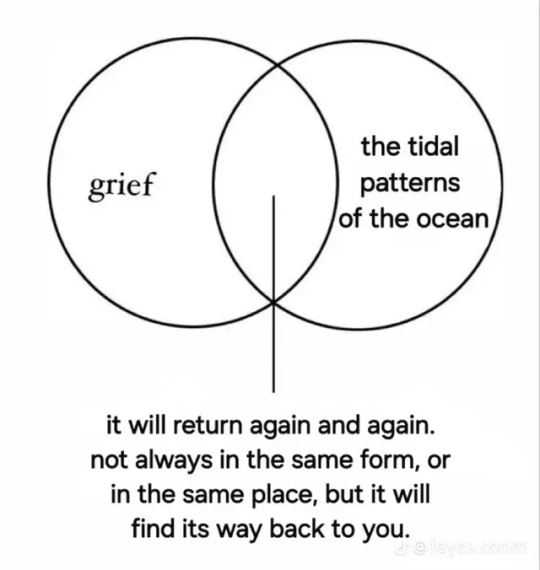stpd + psychosis blog. i share some symptoms w/other PDs but not enough for diagnosis. currently being evaluated for avpd. if i vent anywhere it'll be here. if you have any questions about my illness/es just uhh ask. SIDEBLOG - may contain untagged unreality or similar themes. if you want my main dm me.
Don't wanna be here? Send us removal request.
Text
it’s crazy because you’ll grow up in a household where you had your sense of self and healthy boundaries systematically trained out of you so you have no idea how to say no or stand up for yourself as an adult and you end up in situations that make you compromise more and more of yourself and what you want for yourself until you’re a stranger to yourself because you live your life for others, bound by a sense of obligation to make sure they like you and they’re comfortable and they’re happy at the cost of your one precious life, and the moment you stand up for yourself and tell others that they’re allowed to do so? SELFISH.
2K notes
·
View notes
Text
The data does not support the assumption that all burned out people can “recover.” And when we fully appreciate what burnout signals in the body, and where it comes from on a social, economic, and psychological level, it should become clear to us that there’s nothing beneficial in returning to an unsustainable status quo.
The term “burned out” is sometimes used to simply mean “stressed” or “tired,” and many organizations benefit from framing the condition in such light terms. Short-term, casual burnout (like you might get after one particularly stressful work deadline, or following final exams) has a positive prognosis: within three months of enjoying a reduced workload and increased time for rest and leisure, 80% of mildly burned-out workers are able to make a full return to their jobs.
But there’s a lot of unanswered questions lurking behind this happy statistic. For instance, how many workers in this economy actually have the ability to take three months off work to focus on burnout recovery? What happens if a mildly burnt-out person does not get that rest, and has to keep toiling away as more deadlines pile up? And what is the point of returning to work if the job is going to remain as grueling and uncontrollable as it was when it first burned the worker out?
Burnout that is not treated swiftly can become far more severe. Clinical psychologist and burnout expert Arno van Dam writes that when left unattended (or forcibly pushed through), mild burnout can metastasize into clinical burnout, which the International Classification of Diseases defines as feelings of energy depletion, increased mental distance, and a reduced sense of personal agency. Clinically burned-out people are not only tired, they also feel detached from other people and no longer in control of their lives, in other words.
Unfortunately, clinical burnout has quite a dismal trajectory. Multiple studies by van Dam and others have found that clinical burnout sufferers may require a year or more of rest following treatment before they can feel better, and that some of burnout’s lingering effects don’t go away easily, if at all.
In one study conducted by Anita Eskildsen, for example, burnout sufferers continued to show memory and processing speed declines one year after burnout. Their cognitive processing skills improved slightly since seeking treatment, but the experience of having been burnt out had still left them operating significantly below their non-burned-out peers or their prior self, with no signs of bouncing back.
It took two years for subjects in one of van Dam’s studies to return to “normal” levels of involvement and competence at work. following an incident of clinical burnout. However, even after a multi-year recovery period they still performed worse than the non-burned-out control group on a cognitive task designed to test their planning and preparation abilities. Though they no longer qualified as clinically burned out, former burnout sufferers still reported greater exhaustion, fatigue, depression, and distress than controls.
In his review of the scientific literature, van Dam reports that anywhere from 25% to 50% of clinical burnout sufferers do not make a full recovery even four years after their illness. Studies generally find that burnout sufferers make most of their mental and physical health gains in the first year after treatment, but continue to underperform on neuropsychological tests for many years afterward, compared to control subjects who were never burned out.
People who have experienced burnout report worse memories, slower reaction times, less attentiveness, lower motivation, greater exhaustion, reduced work capability, and more negative health symptoms, long after their period of overwork has stopped. It’s as if burnout sufferers have fallen off their previous life trajectory, and cannot ever climb fully back up.
And that’s just among the people who receive some kind of treatment for their burnout and have the opportunity to rest. I found one study that followed burned-out teachers for seven years and reported over 14% of them remained highly burnt-out the entire time. These teachers continued feeling depersonalized, emotionally drained, ineffective, dizzy, sick to their stomachs, and desperate to leave their jobs for the better part of a decade. But they kept working in spite of it (or more likely, from a lack of other options), lowering their odds of ever healing all the while.
Van Dam observes that clinical burnout patients tend to suffer from an excess of perseverance, rather than the opposite: “Patients with clinical burnout…report that they ignored stress symptoms for several years,” he writes. “Living a stressful life was a normal condition for them. Some were not even aware of the stressfulness of their lives, until they collapsed.”
Instead of seeking help for workplace problems or reducing their workload, as most people do, clinical burnout sufferers typically push themselves through unpleasant circumstances and avoid asking for help. They’re also less likely to give up when placed under frustrating circumstances, instead throttling the gas in hopes that their problems can be fixed with extra effort. They become hyperactive, unable to rest or enjoy holidays, their bodies wired to treat work as the solution to every problem. It is only after living at this unrelenting pace for years that they tumble into severe burnout.
Among both masked Autistics and overworked employees, the people most likely to reach catastrophic, body-breaking levels of burnout are the people most primed to ignore their own physical boundaries for as long as possible. Clinical burnout sufferers work far past the point that virtually anyone else would ask for help, take a break, or stop caring about their work.
And when viewed from this perspective, we can see burnout as the saving grace of the compulsive workaholic — and the path to liberation for the masked disabled person who has nearly killed themselves trying to pass as a diligent worker bee.
I wrote about the latest data on burnout "recovery," and the similarities and differences between Autistic burnout and conventional clinical burnout. The full piece is free to read or have narrated to you in the Substack app at drdevonprice.substack.com
21K notes
·
View notes
Text
fucking hate it when the stuff everybody says "actually works" does actually work.
hate exercising and realizing i've let go of a lot of anxiety and anger because i've overturned my fight-or-flight response.
hate eating right and eating enough and eating 3 times a day and realizing i'm less anxious and i have more energy
hate journaling in my stupid notebook with my stupid bic ballpoint and realizing that i've actually started healing about something once i'm able to externalize it
hate forgiving myself hate complimenting myself more often hate treating myself with kindness hate taking a gratitude inventory hate having patience hate talking to myself gently
hate turning my little face up to the sun and taking deep breaths and looking at nature and grounding myself and realizing that i feel less burdened and more hopeful, more actually-here, that i am able to see the good sides of myself more clearly, that i am able to see not only how far i have to grow - but also how much growth i have already done & how much of my life i truly fill with light and laughter and love
horrible horrible horrible. hate it but i'm gonna do it tho
273K notes
·
View notes
Text
My tip for trying to compartmentalize your emotions or desires is to realize when you're using hyperbolic shorthand for an actually realistic desire. I know realizing even that can be difficult sometimes but let me demonstrate
"I wish I was popular" -> I want to be noticed and engaged with, and I need reassurance and the feeling of connection
"I wanna delete my blog and ghost my friends" -> I want to act out in a visible way that expresses how frustrated I am / I feel overwhelmed with connections and need time to cool off
"I wanna do something reckless/dangerous" -> I feel trapped in obligations and am buckling under stress, I need a sufficient outlet and more freedom to exist in peace
Obviously there may be different kinds of feelings or needs under your particular impulses, these are just some fairly common examples of what you could be feeling. The harder part is trying to figure out what it is that causes this impulse, and even harder might be if you don't have control over the situation, and are unable to have your needs met. It's not always your fault if you're feeling bad, but realizing where it stems from can help you seek out new paths to relieve it. This is something I've learnt working in therapy.
The toddler in your heart has valid needs. But it is a toddler and will scream and cry about it. Learn to sit by until it's done and then ask if it wants a juice box or a hug
16K notes
·
View notes
Text
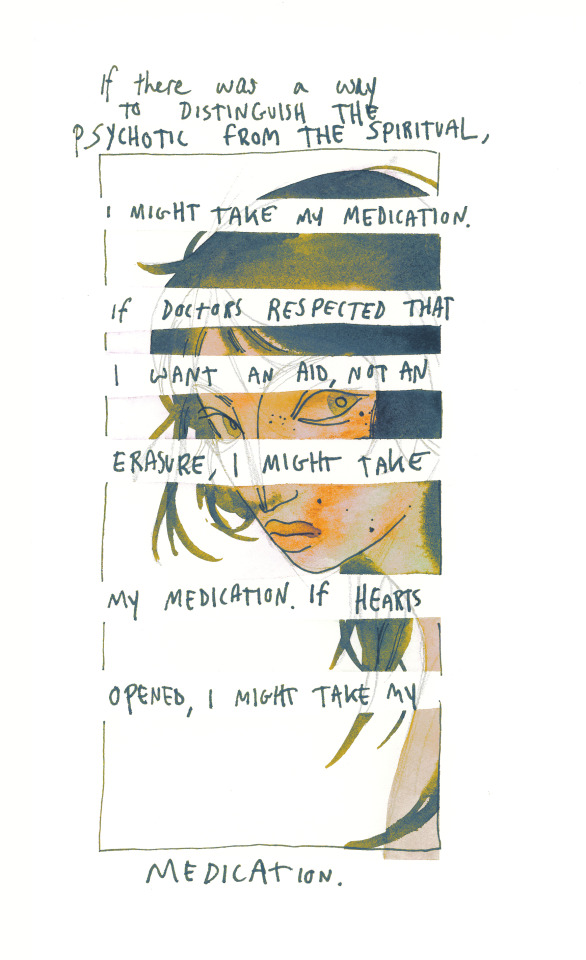

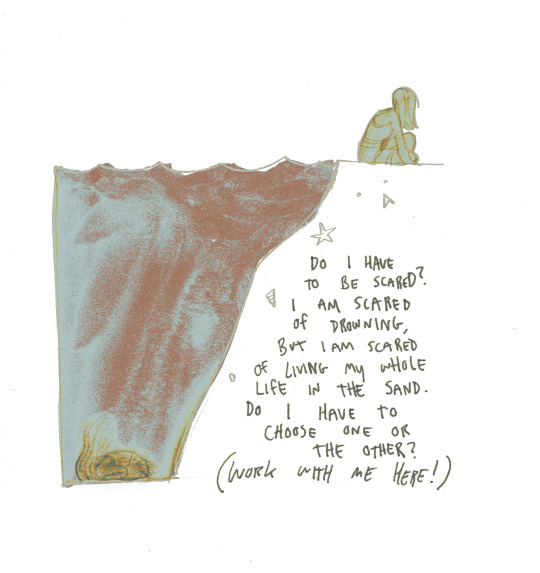
a little diary about trying to find a middle ground between being spiritual and being a schizophrenic
8K notes
·
View notes
Text
when i remember that no amount of waiting will make me brave and no amount of fear will keep me safe
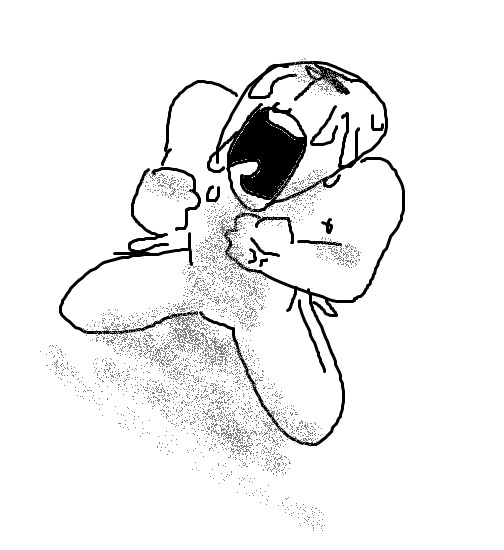
18K notes
·
View notes
Text
I know this might make people mad, but absolutely refusing to even attempt to treat your mental illness, and instead just endlessly inflicting your unmitigated episodes on the people around you, is abusive. Your loved ones are not stress toys that you can just squeeze every time you feel bad. It is bad if someone says your repeated behavior is hurting them, and you take no steps to change. I know damn well that you can’t always help how your brain acts, but I’ve also spent a lot of years trying to stop my spiraling brain in its tracks, work on strategies to calm down, and consider the impact I’m having on others, because I grew up in a household with people who have the attitude of, “I have the right to consume all the attention in the house and drain your energy every single day because I feel miserable, and you’re the bad guy if you say that I’m making you feel bad and that I need to get help. I can treat you however I want because of my anxiety.”
20K notes
·
View notes
Text
executive dysfunction is legitimately physically uncomfortable. i’ll be trapped between two things, weirdly caught on how-much-time-it-might-take-me. i take hours worried im going to take hours doing things. i’ll sit on the floor for the entire day, caught up in the middle of not-doing the chores i actually do want to be doing.
& the amount of mental energy that goes into it. & the legitimate amount of anger and discomfort and self-hate. is not “being lazy”. it’d be a lot less work if i didn’t have to fight myself to just get up and do it.
i just need you to understand it’s not effortless. it’s never effortless. it’s not “okay let me just get up and finally start doing this.” it’s more like. i am slamming my foot on the pedal but the car is in neutral and nothing is moving. it’s more like shouting instructions into a dying telephone. it’s more like being trapped in a small electric box, and someone who hates me is administering shocks.
im trying. im trying. please help me get up.
76K notes
·
View notes
Text
My childhood trauma didn't make me stronger. it made me a people pleaser. it made me forgive way too much. it made me not speak when i'm supposed to. it made me an extreme empath.
19K notes
·
View notes
Text
i thought my suicidal late teens were the hardest years of my life but nothing could’ve prepared me for my 20s waking up everyday with no purpose, feeling so lost, unable to keep up with friendships, watching everyone move on with relationships and careers and being unable to catch up. and I’m such a “life is not a race” type of person but damn I’m losing so hard rn
91K notes
·
View notes
Text
i genuinely think ocd is incredibly underdiagnosed bc i will see people posting what are obvious rituals, compulsions, intrusive thoughts, spiralling, hyper morality, etc and its like Have You Considered This Might Be An Issue
67K notes
·
View notes
Text

Mary Oliver, from "Starlings in Winter", Owls and Other Fantasies: Poems and Essays
2K notes
·
View notes

